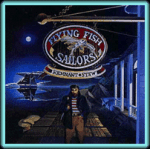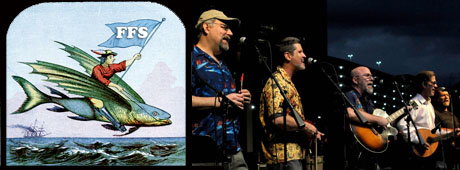 Download this recording for free!
Download this recording for free!
“This album is dedicated to the principles of democracy and freedom of speech; to the oppressed peoples of the earth; to Frank Zappa; and to crawdads everywhere.”
• “Goodbye Mursheen Durkin”
Also found under the titles “Goodbye Muirsheen Durkin” and “Muirshin Durkin.” An Irish ballad about a man named Carney who has grown sick of the work of digging praties (Gaelic for potatoes) and decides to leave Ireland and seek his fortune digging for gold in California. There is some debate on who or what Mursheen Durkin is. Muirsheen is apparently a pet name in Kerry, the diminutive of the boy’s name Muiris (Maurice), meaning Carney is bidding his farewell to “Little Maurice Durkin.” Some believe instead that Muirsheen is a title along the lines of Mrs.
• “Barney”
Also known as “Barney, Leave the Girls Alone.” Barney is married to Judy but still has a roving eye for the ladies. This version includes additional lyrics by Greg Henkel in the form of two verses and altered chorus at the end entreating Barney to “leave the boys alone / and let them sailors be.”
• “Drowsie Maggie/Bald Pate” (instrumental)
A medley of one of the best known reels, “Drowsie Maggie” (also known as “Drowsy Maggie” or “Sleepy Maggie”) and Greg Henkel’s original tune “Bald Pate”
• “You Get a Line, I’ll Get a Pole”
Also known as the “Crawdad Song” or “Honey, Baby Mine.”
This song was part of David Letterman’s Stump the Band segment on October 10, 2002. A visitor from Texas suggested “Honey, Baby Mine” to the band, then sang the chorus when they were “stumped.”
• “The Eddiestone Light”
Also known with the title “The Keeper of the Eddystone Light,” it tells the tale of a sailor, son of the keeper of the Eddystone Lighthouse and a mermaid, who happens upon his mother while “trimming the glim”. When asked about his siblings, he tells her that “one was exhibited as a talking fish, the other served as a savory dish.” She disappears angrily at the news, crying “to Hell with the keeper of the Eddiestone light!”
• “Remnant Stew”
An original ballad by Greg Henkel, introducing the theme of cannibalism to the Flying Fish Sailors repertoire. A weary traveller arrives late at an inn seeking a meal and a bed. The innkeeper agrees, sending out her serving boys to start a cooking fire, then going out herself to prepare a “Remnant Stew.” When asked about the ingredients, she is deliberately vague in describing “a recipe from harder times, when we fastened tight our belts,” but she does ask her tenant to leave word in town as he passes through that she has room for two more serving boys.
• “Cluck Old Hen”
A traditional Appalachian fiddle tune with additional lyrics by Greg Henkel about an old hen of dubious egg-laying ability.
• “Fighting for Strangers”
A dirge-like military song about a boy who signs up to fight for his king in a far-away land. His only rewards for losing an arm and both legs in battle are a military pension and medal from the grateful king, small comfort when he must beg on the streets to make ends meet.
• “Jo Ann’s Stomp” (instrumental)
An original dance tune by Greg Henkel.
• “Ringa Dinga Da”
A wonderfully silly traditional song about a distiller’s daughter, her wooden leg, her lovers, and her husband.
• “The Minstrel Boy” (words by Thomas Moore 1779-1852)
Another dirge-like song, this one from the Civil War and sung to the tune of the Irish air, “The Moreen.” It tells of a minstrel who marched off to war. Though he was slain, his songs remain pure and free.
• “Rights of Man/Tarbolton Reel” (instrumental)
A hornpipe and reel medley of “Rights of Man” and the “Tarbolton Reel”
• “I’ll Tell Me Ma”
A fun and fast-paced street song about the courting of the handsome and pretty “belle of Belfast City.” The song has several regional variations, but this “Belfast version” is one most often heard.
• “A Horse Named Bill” (a cappella)
A thoroughly silly children’s folk song that covers such topics as a horse named Bill’s uncontrollable running, Daisy’s feline-torturing singing, beer hunting, balloon rides, and whales.
• “Ground Hog”
A traditional American folk song about hunting (and eating) a ground hog.
• “Leave Her Johnny”
Also known as “Leave Her Bullies,” “Time for Us to Leave Her”, or “Leave Her.” This shanty was traditionally sung at the end of a voyage, both to keep the rhythm during the final spell at the pumps and for the seamen to air their grievances with their treatment, the food, the ship’s owners, and so forth.


 Remant Stew
Remant Stew 
ChuckEye
January 19th, 2006 at 17:14
Appreciate not having to digitize my cassette in order to listen to this on my iPod, but you’d think a technology guru like Jay would have been able to add proper ID3 tags… 🙂